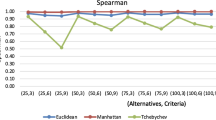Abstract
The reference point method is an interactive technique for multiple criteria optimization problems. It is based on the optimization of the scalarizing achievement function built as the augmented max–min aggregation of individual outcomes with respect to the given reference levels. Actually, the worst individual achievement is optimized, but regularized with the term representing the average achievement. In order to avoid inconsistencies caused by the regularization, we apply the ordered weighted averages (OWA) with monotonic weights to combine all the individual achievements. Further, following the concept of the weighted OWA (WOWA), we incorporate the importance weighting of several achievements into the RPM. We show that the resulting WOWA RPM can be quite effectively implemented as an extension of the original constraints and criteria with simple linear inequalities.





Similar content being viewed by others
References
Granat J, Makowski M (2000) ISAAP—interactive specification and analysis of aspiration-based preferences. Eur J Opnl Res 122:469–485
Kostreva MM, Ogryczak W (1999) Linear optimization with multiple equitable criteria. RAIRO Oper Res 33:275–297
Kostreva MM, Ogryczak W, Wierzbicki A (2004) Equitable aggregations and multiple criteria analysis. Eur J Opnl Res 158:362–367
Lewandowski A, Wierzbicki AP (1989) Aspiration based decision support systems—theory, software and applications. Springer, Berlin
Liu X (2006) Some properties of the weighted OWA operator. IEEE Trans Syst Man Cyber B 368:118–127
Llamazares B (2004) Simple and absolute special majorities generated by OWA operators. Eur J Opnl Res 158:707–720
Malczewski J, Ogryczak W (1990) An interactive approach to the central facility location problem: locating pediatric hospitals in Warsaw. Geogr Anal 22:244–258
Malczewski J, Ogryczak W (1996) Multiple criteria location problem: 2. Preference–based techniques and intertactive decision support. Environ Plan A 28:69–98
Miettinen K, Mäkelä MM (2002) On scalarizing functions in multiobjective optimization. OR Spectr 24:193–213
Ogryczak W (1994) A goal programming model of the reference point method. Ann Opns Res 51:33–44
Ogryczak W (1997) Preemptive reference point method. In: Climaco J (ed) Multicriteria analysis—proceedings of the XIth international conference on MCDM. Springer, Berlin, pp 156–167
Ogryczak W (2001) On goal programming formulations of the reference point method. J Opnl Res Soc 52:691–698
Ogryczak W (2008) WOWA enhancement of the preference modeling in the reference point method. In: MDAI 2008, LNAI vol 5285, pp 38–49
Ogryczak W, Lahoda S (1992) Aspiration/reservation based decision support—a step beyond goal programming. J MCDA 1:101–117
Ogryczak W, Ruszczyński A (2002) Dual stochastic dominance and related mean-risk models. SIAM J Optim 13:60–78
Ogryczak W, Studziński K, Zorychta K (1992) DINAS: a computer-assisted analysis system for multiobjective transshipment problems with facility location. Comp Opns Res 19:637–647
Ogryczak W, Śliwiński T (2003) On solving linear programs with the ordered weighted averaging objective. Eur J Opnl Res 148:80–91
Ogryczak W, Śliwiński T (2007) On Optimization of the importance weighted OWA aggregation of multiple criteria. In: ICCSA 2007, LNCS, vol 4705, pp 804–817
Ogryczak W, Śliwiński T (2007) On decision support under risk by the WOWA optimization. In: ECSQARU 2007, LNAI, vol 4724, pp 779–790
Ogryczak W, Śliwiński T (2009) On efficient WOWA optimization for decision support under risk, Int J Approx Reason 50:915–928
Ogryczak W, Tamir A (2003) Minimizing the sum of the k largest functions in linear time. Inf Proc Lett 85:117–122
Ruiz F, Luque M, Cabello JM (2009) A classification of the weighting schemes in reference point procedures for multiobjective programming. J Opnl Res Soc 60:544–553
Torra V (1997) The weighted OWA operator. Int J Intell Syst 12:153–166
Torra V, Narukawa Y (2007) Modeling decisions information fusion and aggregation operators. Springer, Berlin
Wierzbicki AP (1982) A mathematical basis for satisficing decision making. Math Model 3:391–405
Wierzbicki AP (1986) On completeness and constructiveness of parametric characterizations to vector optimization problems. OR Spectr 8:73–87
Wierzbicki AP, Makowski M, Wessels J (2000) Model based decision support methodology with environmental applications. Kluwer, Dordrecht
Yager RR (1988) On ordered weighted averaging aggregation operators in multicriteria decision making. IEEE Trans Syst Man Cyber 18:183–190
Yager RR (1997) On the analytic representation of the Leximin ordering and its application to flexible constraint propagation. Eur J Opnl Res 102:176–192
Zimmermann H-J (1996) Fuzzy sets theory and its applications. Kluwer, Dordrecht
Acknowledgments
The research was partially supported by the Polish Ministry of Science and Higher Education under the research grant N N516 4307 33.
Author information
Authors and Affiliations
Corresponding author
Rights and permissions
About this article
Cite this article
Ogryczak, W. Ordered weighted enhancement of preference modeling in the reference point method for multiple criteria optimization. Soft Comput 14, 435–450 (2010). https://doi.org/10.1007/s00500-009-0457-6
Published:
Issue Date:
DOI: https://doi.org/10.1007/s00500-009-0457-6




